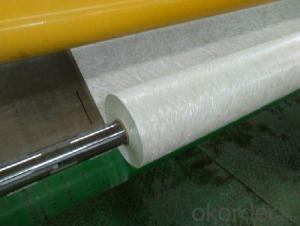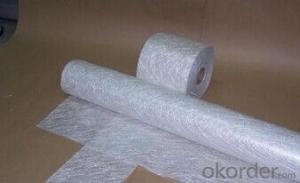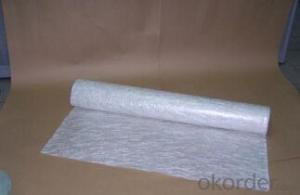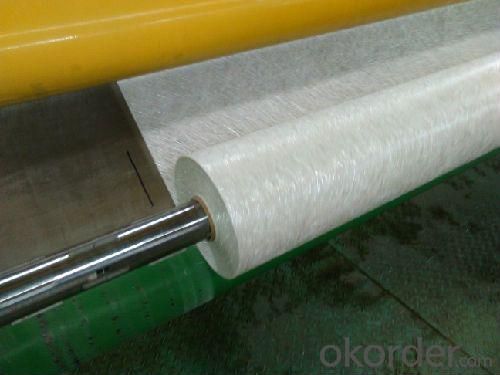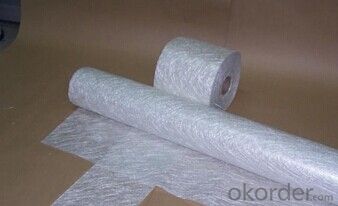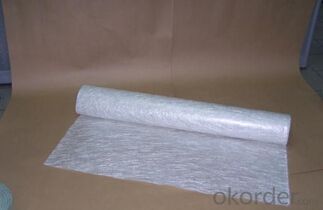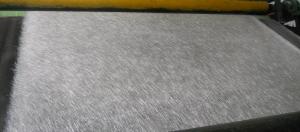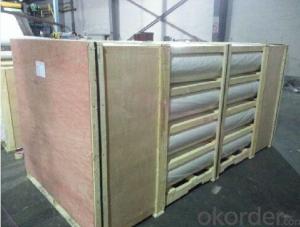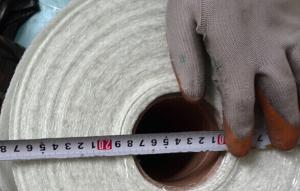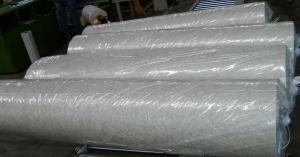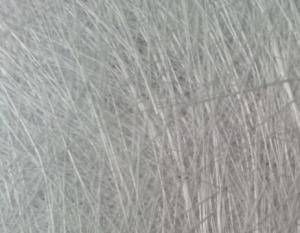Fiberglass Mat Tissue - E-Glass Chopped Strand Mat-Emission, 1270mm
OKorder Service Pledge
OKorder Financial Service
You Might Also Like
Structure of Chopped Strand Mat Description
Glass Fiber Powder Binder Chopped Strand Mat is an unwoven fabrics consisting of randomly distributed chopped strands held together with powder binder.
Powder Chopped Strand Mats are compatible with unsaturated polyester, vinyl ester, phenol and epoxy resins.
The products are widely used in hand lay-up process and can also be used in compression molding and continuous laminating process and fixed table laminating process. The typical end-use applications include various panels, boats, bathroom accessories, automotive parts and cooling towers.
Main Features of E-glass Chopped Strand Mat
1.Strong bond fibers,providing high dimensional stability ans easy handing .
3.Good moldability,fast and complete resin wet-out ,enabling high productively .
4.Good transporsision and hign strength of the composite products.
5.Even thickness ,no fuzz ,no stain.
6.Fast wet-out ,products with high strength ,little loss for strength in damp situation.
E-Glass Chopped Strand Mat Images
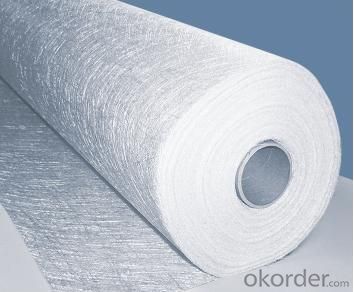
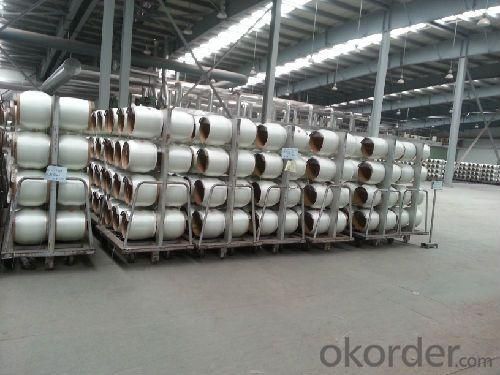
E-Glass Chopped Strand Mat Specification:
Property | Glass type | Weight(g/m2) | Width 200~3300 | Roll Weight | Moisture Content /% | Combustible Content /% | Breakage Strength /N |
Test Method | GB/T 1549 | ISO3374:2000 | ISO3374 | GB/T17470-1998 | ISO3344:1997 | ISO1887:1995 | ISO3342 |
EMC 80 | E-GLASS | 80±16 | ±5 | 6~50 | <0.2 | 13.6±0.35 | ≥200 |
EMC 100 | E-GLASS | 100±10 | ±5 | 6~65 | <0.2 | 9.5±0.35 | ≥170 |
EMC 150 | E-GLASS | 150±15 | ±5 | 6~97 | <0.2 | 8.0±0.35 | ≥40 |
EMC 225 | E-GLASS | 225±22 | ±5 | 6~150 | <0.2 | 5.0±0.6 | ≥60 |
EMC 300 | E-GLASS | 300±30 | ±5 | 6~180 | <0.2 | 4.0±0.6 | ≥90 |
EMC 450 | E-GLASS | 450±45 | ±5 | 6~180 | <0.2 | 3.8±0.6 | ≥120 |
EMC 600 | E-GLASS | 600±60 | ±5 | 6~240 | <0.2 | 3.6±0.6 | ≥150 |
EMC 900 | E-GLASS | 900±90 | ±5 | 6~190 | <0.2 | 3.4±0.6 | ≥180 |
FAQ of Chopped strand mat
1. Why Choose us?
CNBM is a stated own company, provide the guarantee for the best quality, best service and safety business.
2. How will we guarantee the quality?
a, ISO 9001-2008 quality control system;
b, Strict and regular quality control in production;
c, Inspeciation when loading into container before shippment;
d, Sample stock for one year for quality tracing and record.
3. What is your MOQ?
Our MOQ is one pallet.
4. Can you provide sample?
Yes, samples are in stock. we can offer free sample for you.
5. Payment terms?
We can accept L/C, T/T etc.
6. Do you offer OEM service?
Yes, we can print customers’ logo on the packaging;
And the size and specification can be produced and design according to your demand.
7. What is the Production Lead Time?
1 *40HQ each day.
- Q: What are the different reinforcement densities available for fiberglass mat tissue?
- The different reinforcement densities available for fiberglass mat tissue can vary depending on the specific manufacturer and product. However, common options include low density (lightweight), medium density, and high density fiberglass mat tissues. These densities are designed to provide different levels of strength, flexibility, and durability for various applications in industries such as construction, automotive, and marine.
- Q: How is fiberglass mat tissue used in the construction industry?
- Various applications in the construction industry make fiberglass mat tissue widely used. This material consists of thin strands of glass fibers bonded together with a resin, providing properties suitable for construction purposes. Roofing materials often utilize fiberglass mat tissue as a reinforcement layer in shingles or sheets. It enhances the roof's strength and durability, making it more resistant to weather elements like wind, rain, and hail. It also prevents cracking and splitting, extending the lifespan of the roofing material. Fiberglass mat tissue has another application in the construction industry, specifically in the production of composite materials. It serves as a reinforcement layer in composite panels and boards, enhancing their strength and stiffness. Its lightweight nature makes it ideal for building materials that require both strength and reduced weight. In the construction of walls and ceilings, fiberglass mat tissue can be applied between the gypsum board and insulation material. This provides additional strength and impact resistance, preventing cracks and damage to the building's structure. Additionally, fiberglass mat tissue finds use in the manufacturing of pipes and tanks. It reinforces fiberglass-reinforced plastic (FRP) pipes and tanks, adding strength and rigidity. This makes it suitable for various industrial applications, including chemical processing, wastewater treatment, and the oil and gas industries. In summary, fiberglass mat tissue is widely used in the construction industry due to its strength, durability, and lightweight properties. It is applied in roofing materials, composite panels, walls, ceilings, pipes, and tanks, among other applications. Construction professionals prefer it for its versatility and ability to enhance the structural integrity of various building components.
- Q: Can fiberglass mat tissue be used for insulation in cold environments?
- Yes, fiberglass mat tissue can be used for insulation in cold environments. Fiberglass is a common material used for insulation due to its excellent thermal properties. It has a low thermal conductivity, meaning it can effectively resist the transfer of heat, thus providing insulation in cold environments. Fiberglass mat tissue is specifically designed to provide thermal insulation and is commonly used in applications such as walls, roofs, and floors to prevent heat loss and maintain a comfortable temperature indoors. Additionally, fiberglass is resistant to moisture and does not easily degrade or lose its insulating properties in cold and damp conditions, making it a suitable choice for insulation in cold environments.
- Q: What is the flexibility of fiberglass mat tissue at low temperatures?
- The flexibility of fiberglass mat tissue at low temperatures is generally maintained, as fiberglass has low thermal expansion and contraction properties, allowing it to retain its flexibility even in cold conditions.
- Q: Can fiberglass mat tissue be used for insulation in shopping malls?
- Yes, fiberglass mat tissue can be used for insulation in shopping malls.
- Q: How is fiberglass mat tissue used in the production of chemical reactors?
- Fiberglass mat tissue is used in the production of chemical reactors as a reinforcement material. It is typically applied to the inner surface of the reactor to provide structural strength, enhance resistance to corrosion, and improve overall durability. The fiberglass mat tissue acts as a barrier against chemical reactions, preventing leaks or damage to the reactor. Additionally, it helps maintain a stable temperature inside the reactor, ensuring efficient and safe chemical processes.
- Q: How is fiberglass mat tissue used in the production of chemical storage tanks?
- Fiberglass mat tissue serves as a reinforcement material in the manufacturing of chemical storage tanks. It is combined with resin to create a composite material that offers strength, durability, and protection against different chemicals. By layering the fiberglass mat tissue within the tank structure, its structural integrity is enhanced, and the risk of leakage is prevented. During the manufacturing process, resin, typically polyester or epoxy, is impregnated into the fiberglass mat tissue to establish a strong bond between the fibers and the matrix. This impregnated mat is then placed on a mold or mandrel and covered with additional layers of resin and mat, resulting in a laminate. The number of layers and thickness can vary based on the desired tank specifications and the chemicals it will store. The combination of fiberglass mat tissue and resin yields outstanding corrosion resistance, making it ideal for storing a wide range of chemicals. Fiberglass is inherently non-reactive and can endure exposure to harsh chemicals, acids, and alkalis without compromising the tank's structural integrity or degrading. Hence, fiberglass mat tissue is the preferred material for chemical storage tanks as it guarantees the safety of stored chemicals and minimizes the risk of leaks or contamination. Moreover, the utilization of fiberglass mat tissue enables the production of tanks with complex shapes and sizes. It can be easily molded and formed into various configurations, providing flexibility in design. This ensures that chemical storage tanks can be tailored to specific requirements and seamlessly integrated into diverse industrial applications. In conclusion, fiberglass mat tissue is indispensable in the manufacturing of chemical storage tanks. It reinforces the tank structure, offers chemical resistance, and facilitates the fabrication of tanks with diverse shapes and sizes. When combined with resin, it creates a durable and corrosion-resistant composite material, ensuring the secure storage of chemicals in a variety of industrial settings.
- Q: How is fiberglass mat tissue used in the production of storage containers?
- Fiberglass mat tissue is commonly used in the production of storage containers due to its unique properties and benefits. Firstly, the fiberglass mat tissue is a thin layer of non-woven fibers made from glass, which provides excellent strength and durability. This makes it an ideal material for reinforcing the structure of storage containers, ensuring they can withstand heavy loads and resist deformation. Additionally, fiberglass mat tissue is highly resistant to corrosion, moisture, and chemicals. This makes it particularly suitable for storage containers that may be exposed to harsh environments or contain corrosive substances. The fiberglass mat tissue acts as a protective barrier, preventing any potential damage or degradation to the container. Furthermore, fiberglass mat tissue is lightweight, making it easier and more cost-effective to transport and handle during the production process. It also contributes to the overall weight reduction of the storage container, allowing for increased payload capacity and more efficient storage and transportation. In terms of production, the fiberglass mat tissue is typically applied to the surface of the storage container during the molding process. It is often impregnated with a resin or adhesive, which, when cured, forms a strong bond with the container, enhancing its structural integrity. Overall, fiberglass mat tissue plays a crucial role in the production of storage containers by providing strength, durability, corrosion resistance, and weight reduction. Its versatility and unique properties make it a preferred choice for manufacturers aiming to produce high-quality and long-lasting storage containers.
- Q: Does fiberglass mat tissue provide any acoustic insulation?
- Some degree of acoustic insulation is indeed offered by fiberglass mat tissue. By virtue of its fibrous structure, it possesses the ability to absorb sound waves and diminish their transmission through walls or other surfaces. However, it is vital to acknowledge that the extent of acoustic insulation provided by fiberglass mat tissue may differ based on factors like thickness, density, and the particular application. In certain instances, the attainment of optimal acoustic insulation may necessitate the incorporation of supplementary layers or thicker materials.
- Q: How does the thickness of fiberglass mat tissue affect its performance?
- The thickness of fiberglass mat tissue directly affects its performance. A thicker tissue provides increased strength, durability, and insulation properties. It also enhances the material's ability to absorb impact and resist damage. Thinner tissues, on the other hand, offer greater flexibility and easier handling. Therefore, choosing the appropriate thickness of fiberglass mat tissue is crucial to achieve desired performance characteristics in various applications.
Send your message to us
Fiberglass Mat Tissue - E-Glass Chopped Strand Mat-Emission, 1270mm
OKorder Service Pledge
OKorder Financial Service
Similar products
Hot products
Hot Searches
Related keywords
